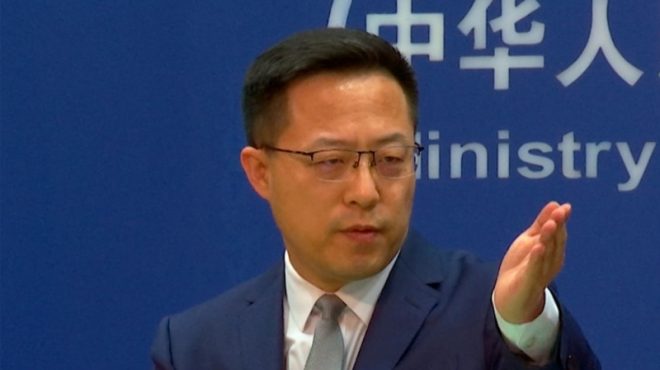China has warned Canada and Australia to stop their provocations or face “severe consequences,” after Ottawa and Canberra accused Chinese warplanes of intercepting their reconnaissance aircraft in the Pacific Ocean.
Chinese Foreign Ministry spokesperson Zhao Lijian made the remarks at a regular press briefing on Monday, after Canada accused Beijing of harassing its patrol aircraft during patrols to monitor UN sanctions on North Korea.
“The UN Security Council has never authorized any country to carry out military surveillance in the seas and airspace of other countries in the name of enforcing sanctions,” Zhao said.
China’s Defense Ministry also said in a statement that Canadian military jets have stepped up reconnaissance and “provocations” against China “under the pretext” of implementing UN Security Council resolutions, endangering the Asian country’s national security.
Chinese Defense Ministry spokesperson Wu Qian said the Chinese military took reasonable measures to deal with Canada’s actions and has made “solemn representations” via diplomatic channels.
Last week, the Canadian Armed Forces said interactions between Canadian and Chinese aircraft have become more frequent in recent times, adding that Chinese planes had sometimes forced Canadian planes to divert from their flight paths to “avoid a potential collision with the intercepting aircraft”.
It also accused Chinese pilots of failing to “adhere to international air safety norms” and putting the safety of Canadian personnel at risk.
Canadian Prime Minister Justin Trudeau later said his government took the situation “very seriously, ”stressing that Canada was an active member of “an important mission” in the North Pacific to ensure that sanctions on North Korea are properly enforced.
The latest development comes as China and Russia have increasingly called on the UN Security Council to ease sanctions against North Korea on humanitarian grounds.
North Korea has been subjected to international economic sanctions since 2006 in relation to its ballistic missile programs and nuclear activities.
China further warned Australia to “act prudently” or face “serious consequences,” stressing that it would “never allow any country to infringe upon China’s sovereignty and security… under the pretext of freedom of navigation”.
This came after Australian Defense Minister Richard Marles accused Chinese warplanes of dangerously intercepting one of its spy planes over the South China Sea on Sunday.
Marles said that a Chinese J-16 fighter intercepted a P-8 surveillance aircraft late last month, in a “dangerous” maneuver that put the safety of the Australian Defense Force crew at risk.
“China once again urges Australia to earnestly respect China’s national security interests and core interests, act and speak prudently to avoid a miscalculation occurring that results in serious consequences,” Zhao said.
He added that China’s military has always conducted operations in a “safe, standard and professional manner” in line with international law.
Beijing claims sovereignty over nearly all of the South China Sea, which is also claimed in part by Taiwan, Brunei, Vietnam, Malaysia and the Philippines.
A number of regional countries, including Vietnam, the Philippines, and Malaysia, are involved in territorial disputes with China in the South China Sea, in the Pacific Ocean. While Australia is not among them, it is well inclined against China and has in the past joined provocative maneuvers by the United States in the region.
The South China Sea is a gateway to major sea routes, through which about 3.4 trillion dollars’ worth of trade passes each year.
China claims the strategic waterway is its sovereign territory and has since 2014 built artificial islands on reclaimed reefs and installed military bases on them
 Alghadeer TV Alghadeer TV
Alghadeer TV Alghadeer TV

